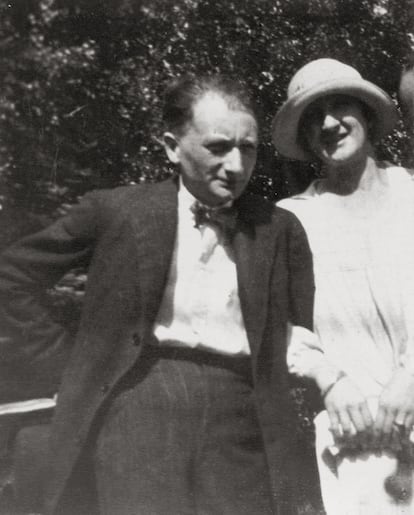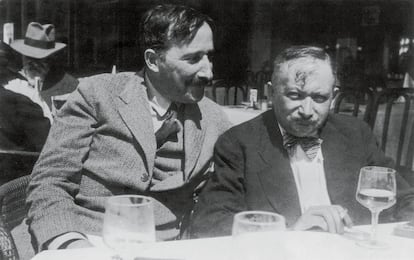Six reasons why we love Joseph Roth
More than 80 years after his death, the writer is still one of the most revered, quoted and honored authors

No one can say that he did not enjoy a fame and recognition while he was alive. Radetzky March was a tremendous novel with many fans, and German actress Marlene Dietrich put him on the map when she confessed that Job was her favorite book. However, when Joseph Roth died of cirrhosis in a Paris hospital in May 1939, the city’s Jews didn’t say kaddish for him (they saw him as a convert) nor did the Catholic priests agreed to say Mass (no one knew if he was baptized). Even his tombstone reads like an affront: “Austrian poet.” This is despite the fact he died stateless and without ever recognizing the republic that succeeded the Austro-Hungarian Empire. He left an unpublished manuscript that would be published months later by a German editor in exile in Amsterdam; a practically secret edition that was almost lost in the dawn of the new war. Nothing hinted at posterity. He was even forgotten by his friends, stateless people like him, some close to suicide, such as novelist Stefan Zweig. There was no indication that more than 80 years later, at the beginning of the 21st century, he would be one of the most revered, quoted and honored authors.
Interest in Roth is growing, and there is no sign that it will wane. In addition to the constant reprints of his books, new essays on him are being published this year, as well as a recently released biography by Keiron Pim, which delves into his legendary character. Nonetheless, no evidence is more convincing of Roth’s current relevance than his inclusion as a character in Berlin Nocturne, the latest installment of the Corto Maltese comic book.
What would drive a legion of readers to become interested in the life and work of a poor, stateless, alcoholic Jew? The reasons are mysterious. Regardless, I will venture six attributes that reinforce Roth’s contemporaneity and may explain why so many followers consider him as one of their own.
1. He is a prophet. Although he did not live long enough to see his prophecies fulfilled, Joseph Roth was one of the first intellectuals to predict the Holocaust. He deeply understood the xenophobic, violent transformation of German society, and singled out the Nazis as the destroyers of civilization, even before they came to power and long before the threat was taken seriously by anyone. In The Wandering Jews he talks about the world of the shtetls, the Eastern European Jewish villages – like the one he was born in – which he considered already lost. This was in 1927, eight years before the Nuremberg Laws! Reading books such as The Antichrist, one is amazed by his insight and the indifference he came up against.

2. He is a nomad who never had a home. The young people of the 21st century, made anxious by an aimless life without a mortgage or a garden to call their own, are a bit similar to Roth, who always lived in hotels, had no children and had romantic relationships that today would be called fluid, open and free (one of them tragic: he spent almost all of his money went to pay for treatment for his schizophrenic wife). His first important work was Hotel Savoy, and from then on his books were full of vagabonds, travelers and hustlers. There are no Ulysses or Ithacas to be found in his pages: everyone assumes that life is fragile and unstable and one has to adapt to perpetual motion, because capitalism has destroyed all certainties and sense of community.
3. He yearns for the sacred. Like all uprooted people, he feels an enormous nostalgia for a world where another life was possible, one with community ties, where things made sense and transcendence was an everyday miracle that no cynic denied. Had he lived today, he would probably be labeled a stubborn nostalgic; Radetzky March might as well be a reactionary pamphlet. Of course, he would still have postmodern advocates – he does, in fact – who would interpret his nostalgic bent as a subtle response to the banality of the present.
4. He is a readable narrator that transcends fashions. Roth’s voice is unique. It is not linked to any movement, it does not resemble anything and, therefore, it does not need any explanation or interpretation, even though it can be subject to many analyses. And while it is better understood with a basic knowledge of Judaism (all his narrative draws from that tradition), one does not need to know about the theological disputes between the Hasidic and the Enlightened Jews of 17th century Poland to understand Tarabas, because Roth is an oral storyteller, with a simplicity that dazzles and transcends any cultural or historical barrier. He can be fashionable at any time, as his literature is timeless, just like the Bible.

5. As a debater, he took no prisoners. A Joseph Roth on Twitter would be terrifying. There were few controversies of his time in which he did not express an opinion: his collections of articles and his correspondence reveal a temperamental, witty and very difficult to refute debater; he was a fearsome opponent in any dispute. Neither friendship nor personal debt softened his judgment: if he had to call someone an idiot as part of a heated argument, he did so without hesitation. Poor Stefan Zweig knew it well – he received many letters from Roth, who, after harshly reproaching him for his political positions, asked him for money.
6. His personal tragedy moves today’s hyper-sentimental world. If Roth’s books weren’t enough on their own, the writer’s life (or rather, his death) would place him in the 21st century Parnassus: lonely, hopeless, sick and a preemptive victim of the most horrible criminals in Europe. When the owner of the Paris hotel where he lived his last few months refused him alcohol, saying that he had had enough to drink, he would secretly go to another café and order a clandestine Pernod. He was not a smug drunk; he was just a poor, sad and resigned man. Someone to love.
Tu suscripción se está usando en otro dispositivo
¿Quieres añadir otro usuario a tu suscripción?
Si continúas leyendo en este dispositivo, no se podrá leer en el otro.
FlechaTu suscripción se está usando en otro dispositivo y solo puedes acceder a EL PAÍS desde un dispositivo a la vez.
Si quieres compartir tu cuenta, cambia tu suscripción a la modalidad Premium, así podrás añadir otro usuario. Cada uno accederá con su propia cuenta de email, lo que os permitirá personalizar vuestra experiencia en EL PAÍS.
¿Tienes una suscripción de empresa? Accede aquí para contratar más cuentas.
En el caso de no saber quién está usando tu cuenta, te recomendamos cambiar tu contraseña aquí.
Si decides continuar compartiendo tu cuenta, este mensaje se mostrará en tu dispositivo y en el de la otra persona que está usando tu cuenta de forma indefinida, afectando a tu experiencia de lectura. Puedes consultar aquí los términos y condiciones de la suscripción digital.









































